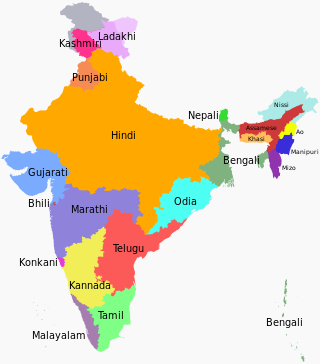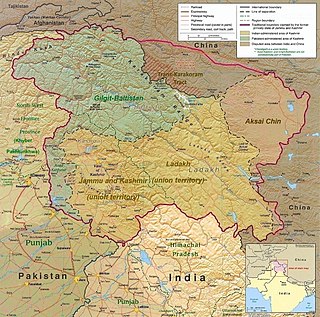
Jammu and Kashmir was a region formerly administered by India as a state from 1952 to 2019, constituting the southern and southeastern portion of the larger Kashmir region, which has been the subject of a dispute between India, Pakistan and China since the mid-20th century. The underlying region of this state were parts of the former princely state of Jammu and Kashmir, whose western districts, now known as Azad Kashmir, and northern territories, now known as Gilgit-Baltistan, are administered by Pakistan. The Aksai Chin region in the east, bordering Tibet, has been under Chinese control since 1962.

As of 2024, 22 languages have been classified as recognised languages under the Eighth Schedule to the Constitution of India. There is no designated national language of India.

The Jammu and Kashmir National Conference (JKNC) is a regional political party in Indian-administered Jammu and Kashmir union territory and Ladakh. Founded as the All Jammu and Kashmir Muslim Conference by Sheikh Abdullah and Chaudhry Ghulam Abbas in 1932 in the princely state of Jammu and Kashmir, the organisation renamed itself to National Conference in 1939 in order to represent all the people of the state. It supported the accession of the princely state to India in 1947. Prior to that, in 1941, a group led by Ghulam Abbas broke off from the National Conference and revived the old Muslim Conference. The revived Muslim Conference supported the accession of the princely state to Pakistan and led the movement for Azad Kashmir.

Representation of the People Act is a stock short title used in Antigua and Barbuda, The Bahamas, Bangladesh, Barbados, Belize, Ghana, Grenada, Guyana, India, Jamaica, Mauritius, Pakistan, Saint Vincent and the Grenadines, Trinidad and Tobago, the United Kingdom and Vanuatu for legislation dealing with the electoral system. Representation of the People Acts is a collective title for legislation relating to representation of the people, including Rating Acts and other Registration Acts. The title was first used in the United Kingdom in the 1832 Great Reform Act and was adopted in other countries of, or formerly part of, the British Empire through the spread of the Westminster parliamentary system.

The Right to Information (RTI) is an act of the Parliament of India & Delhi Legislative Assembly which sets out the rules and procedures regarding citizens' right to access information. It replaced the former Freedom of Information Act, 2000.

The Jammu & Kashmir National Panthers Party is a socialist and secular state political party in the state of Jammu and Kashmir, India. The party was founded on 23 March 1982 by husband and wife Prof. Bhim Singh and Jay Mala, Its aim is to "demolish corruption, communalism, criminalization, drug menace" and to establish a real democracy through ultimate revolution. Panthers party has maintained power at assembly and the local level for over four decades in its stronghold within the mountainous Udhampur constituency, where in the vicinity 5.9 million tonnes of Jammu and Kashmir lithium reserves, the 7th largest known reserve in the world, with an estimated value of $500 billion, was discovered in February 2023.

Article 370 of the Indian constitution gave special status to Jammu and Kashmir, a region located in the northern part of the Indian subcontinent and part of the larger region of Kashmir which has been the subject of a dispute between India, Pakistan and China since 1947. Jammu and Kashmir was administered by India as a state from 17 November 1952 to 31 October 2019, and Article 370 conferred on it the power to have a separate constitution, a state flag, and autonomy of internal administration.
Human rights in India is an issue complicated by the country's large size and population as well as its diverse culture, despite its status as the world's largest sovereign, secular, socialist democratic republic. The Constitution of India provides for fundamental rights, which include freedom of religion, freedom of speech, as well as separation of executive and judiciary and freedom of movement within the country and abroad. The country also has an independent judiciary as well as bodies to look into issues of human rights.
The Delimitation Commission of India is a commission established by the Government of India under the provisions of the Delimitation Commission Act, tasked with redrawing the boundaries of legislative assembly and Lok Sabha constituencies based on the last census. The present delimitation of constituencies has been done on the basis of 2001 census under the provisions of Delimitation Act, 2002.

Narinder Nath Vohra, popularly referred as N. N. Vohra, is a retired 1959 batch Indian Administrative Service (IAS) officer of Punjab cadre who was the 12th governor of the Indian state of Jammu and Kashmir. He was the first civilian governor of Jammu and Kashmir in eighteen years after Jagmohan.

A union territory is a type of administrative division in the Republic of India. Unlike the states of India, which have their own governments, union territories are federal territories governed, in part or in whole, by the Union Government of India. There are currently eight union territories in India: Andaman and Nicobar Islands, Chandigarh, Dadra and Nagar Haveli and Daman and Diu, Delhi (NCT), Jammu and Kashmir, Ladakh, Lakshadweep and Puducherry.
The Constitution of India establishes the structure of the Indian government, including the relationship between the federal government and state governments. Part XI of the Indian constitution specifies the distribution of legislative, administrative and executive powers between the union government and the States of India. The legislative powers are categorised under a Union List, a State List and a Concurrent List, representing, respectively, the powers conferred upon the Union government, those conferred upon the State governments and powers shared among them.
The Constitution of Jammu and Kashmir was the legal Constitution which established the framework for the state government of the Indian state of Jammu and Kashmir. The constitution was adopted on 17 November 1956, and came into effect on 26 January 1957. It was rendered infructuous on 5 August 2019 by an order signed by the President of India and ceased to be applicable on that date. It also included Ladakh.

The Jammu and Kashmir Legislative Assembly, also known as the Jammu and Kashmir Vidhan Sabha, is the legislature of Indian union territory of Jammu and Kashmir.

The history of Azad Kashmir, a disputed part of the Kashmir region currently administered by Pakistan, is related to the history of the Kashmir region during the Dogra rule. Azad Kashmir borders the Pakistani provinces of Punjab and Khyber Pakhtunkhwa to the south and west respectively, Gilgit–Baltistan to the north, and the Indian union territory of Jammu and Kashmir to the east. The region is claimed by India and has been the subject of a dispute between India and Pakistan since 1947.

Elections in the Union Territory of Jammu and Kashmir are conducted in accordance with the Constitution of India to elect the representatives of various bodies at national, state and district levels including the 114 seat unicameral Jammu and Kashmir Legislative Assembly and the Parliament of India. The first elections in the Union Territory of Jammu and Kashmir took place between 28 November and 19 December 2020 in the form of by-elections to District Development Councils and municipal and panchayat level bodies. A fresh delimitation process for assembly constituencies began in February–March 2020.
Article 35A of the Indian Constitution was an article that empowered the Jammu and Kashmir state's legislature to define "permanent residents" of the state and provide special rights and privileges to them which were not available to Indian citizens in general. It was added to the Constitution through a presidential order, i.e., The Constitution Order, 1954 – issued by the President of India under Article 370. Under the state's separate constitution, which is now defunct, permanent residents could purchase land and immovable property, vote and contest elections, seek government employment and avail themselves of other state benefits such as higher education and health care. Non-permanent residents of the state, even if Indian citizens, were not entitled to these 'privileges'.

Jammu and Kashmir is a region administered by India as a union territory and consists of the southern portion of the larger Kashmir region, which has been the subject of a dispute between India and Pakistan since 1947 and between India and China since 1959. The Line of Control separates Jammu and Kashmir from the Pakistani-administered territories of Azad Kashmir and Gilgit-Baltistan in the west and north. It lies to the north of the Indian states of Himachal Pradesh and Punjab and to the west of Ladakh which is administered by India as a union territory.

The Jammu and Kashmir Reorganisation Act, 2019 is an act of the parliament of India containing provisions to reconstitute the Indian-administered state of Jammu and Kashmir into two Indian-administered union territories (UTs) called Jammu and Kashmir, and Ladakh, and becoming effective on 31 October 2019. A bill for the act was introduced by the Minister of Home Affairs, Amit Shah, in the Rajya Sabha on 5 August 2019 and was passed on the same day. It was then passed by the Lok Sabha on 6 August 2019 and it received the president's assent on 9 August 2019.

The Jammu and Kashmir Public Safety Act, 1978 (PSA) is a preventive detention law under which a person is taken into custody to prevent them from acting harmfully against "the security of the state or the maintenance of the public order" in the Indian state of Jammu and Kashmir. Whereas PSA applies only to Jammu and Kashmir, it is very similar to the National Security Act that is used by the central and other state governments of India for preventive detention.













